UX writers play a key role in shaping the user experience by crafting clear and concise content that guides users through digital products. They ensure that every word on an interface serves a purpose, making interactions intuitive and enjoyable.
Skills required for a UX writer include strong writing and editing abilities, a deep understanding of user behavior, and the ability to collaborate effectively with designers and developers. These skills help create content that not only informs but also enhances the overall user experience.
Candidates can write these abilities in their resumes, but you can’t verify them without on-the-job UX Writer skill tests.
In this post, we will explore 9 essential UX Writer skills, 11 secondary skills and how to assess them so you can make informed hiring decisions.
Table of contents
9 fundamental UX Writer skills and traits
The best skills for UX Writers include Writing Clarity, User Empathy, Microcopy Crafting, Content Strategy, Information Architecture, SEO Knowledge, Collaboration, Usability Testing and Adaptability.
Let’s dive into the details by examining the 9 essential skills of a UX Writer.
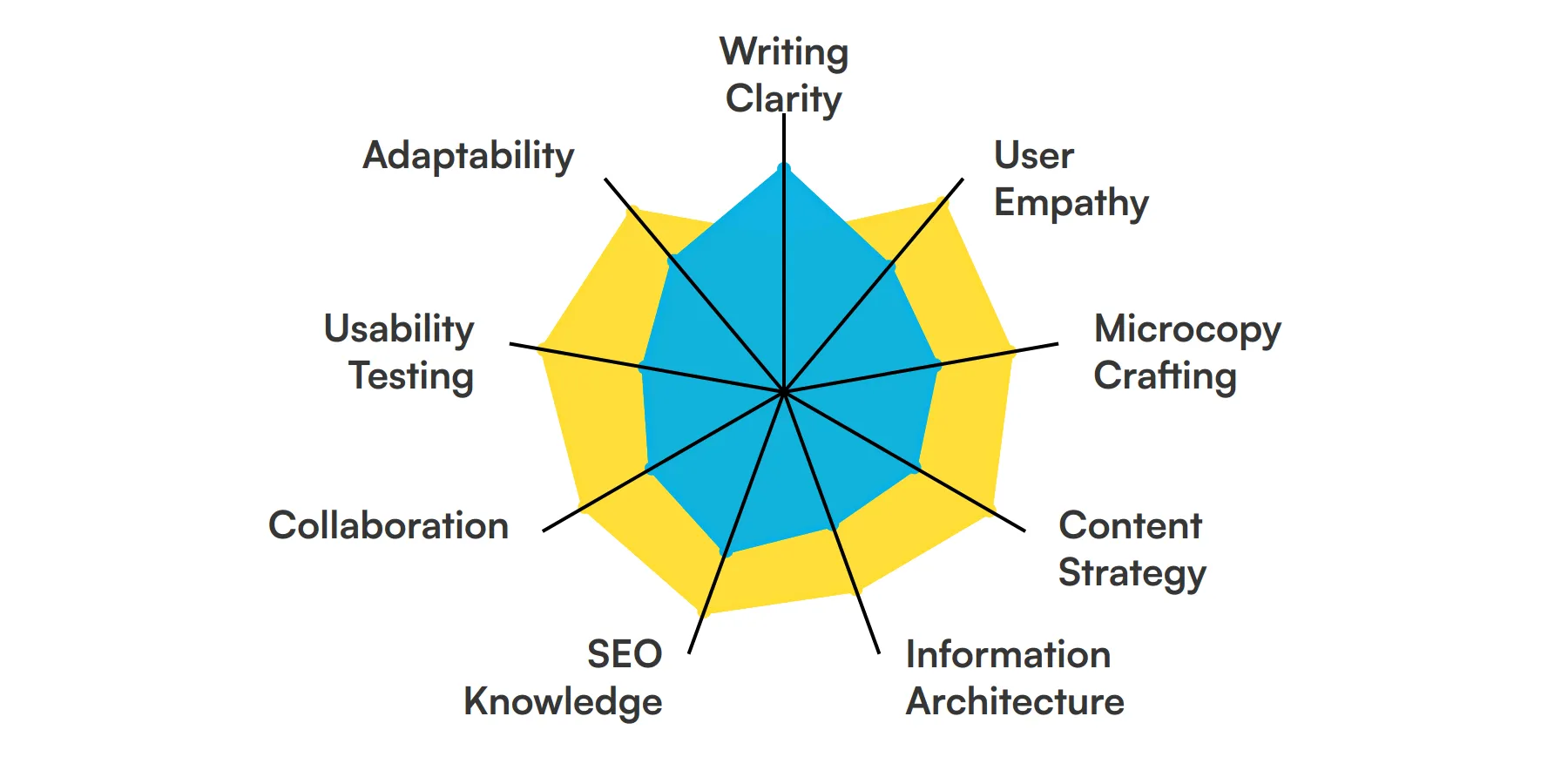
Writing Clarity
A UX writer must ensure that every piece of text is clear and easily understandable. This skill is crucial for creating user interfaces that guide users effortlessly through tasks, reducing confusion and improving the overall user experience.
For more insights, check out our guide to writing a Content Writer Job Description.
User Empathy
Understanding the user's perspective is key for a UX writer. By empathizing with users, the writer can craft messages that resonate with their needs and emotions, making the interface more intuitive and user-friendly.
Microcopy Crafting
Microcopy includes small bits of text like button labels, error messages, and tooltips. A UX writer needs to be adept at crafting these elements to provide clear guidance and enhance the user's interaction with the product.
Check out our guide for a comprehensive list of interview questions.
Content Strategy
Developing a content strategy involves planning and managing content across the user journey. A UX writer uses this skill to ensure consistency and coherence in the messaging, aligning it with the overall brand voice and user needs.
Information Architecture
This skill involves organizing and structuring content in a way that makes it easy for users to find and understand information. A UX writer uses information architecture to create logical and user-friendly navigation paths.
For more insights, check out our guide to writing a Information Architect Job Description.
SEO Knowledge
Understanding search engine optimization helps a UX writer create content that is not only user-friendly but also discoverable. This skill ensures that the content ranks well in search engines, driving more traffic to the product.
Collaboration
A UX writer often works closely with designers, developers, and product managers. Strong collaboration skills are essential to ensure that the content aligns with the design and functionality of the product, creating a seamless user experience.
Check out our guide for a comprehensive list of interview questions.
Usability Testing
Conducting usability tests allows a UX writer to gather feedback on how users interact with the content. This skill helps in refining and optimizing the text to better meet user needs and improve overall usability.
Adaptability
The ability to adapt to different tones, styles, and formats is crucial for a UX writer. This skill ensures that the content can be tailored to various user segments and contexts, maintaining relevance and effectiveness.
For more insights, check out our guide to writing a Project Manager Job Description.
11 secondary UX Writer skills and traits
The best skills for UX Writers include Basic HTML/CSS, Analytics Interpretation, Localization, A/B Testing, Accessibility Standards, Project Management, Graphic Design Basics, Psychology Principles, Content Management Systems, Brand Voice Development and Research Skills.
Let’s dive into the details by examining the 11 secondary skills of a UX Writer.
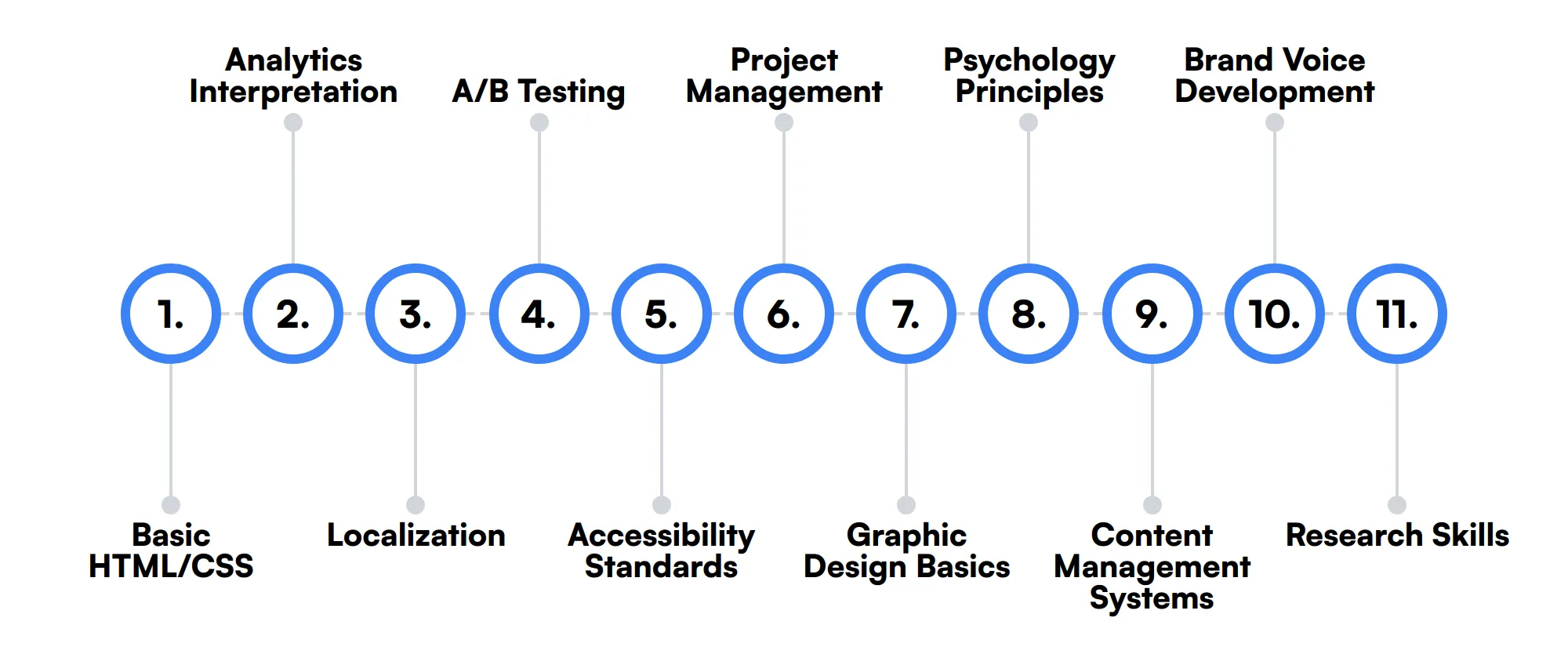
Basic HTML/CSS
Having a basic understanding of HTML and CSS can help a UX writer collaborate more effectively with developers. It allows them to understand the technical constraints and possibilities, ensuring that the content is implemented correctly.
Analytics Interpretation
Being able to interpret analytics data helps a UX writer understand how users interact with the content. This skill is useful for making data-driven decisions to improve the user experience.
Localization
Localization involves adapting content for different languages and cultures. A UX writer with this skill can ensure that the product is accessible and relevant to a global audience.
A/B Testing
A/B testing allows a UX writer to compare different versions of content to see which performs better. This skill is useful for optimizing text to achieve the best user engagement and conversion rates.
Accessibility Standards
Understanding accessibility standards ensures that the content is usable by people with disabilities. A UX writer with this skill can create inclusive content that meets legal requirements and enhances the user experience for all.
Project Management
Project management skills help a UX writer keep track of deadlines, coordinate with team members, and manage multiple tasks efficiently. This ensures that content projects are completed on time and meet quality standards.
Graphic Design Basics
A basic understanding of graphic design can help a UX writer create more visually appealing content. This skill is useful for creating mockups and understanding how text and visuals work together in the user interface.
Psychology Principles
Knowledge of psychology principles can help a UX writer understand user behavior and motivations. This insight is valuable for crafting persuasive and engaging content that resonates with users.
Content Management Systems
Familiarity with content management systems (CMS) allows a UX writer to efficiently manage and update content. This skill is essential for maintaining consistency and accuracy across the product.
Brand Voice Development
Developing a consistent brand voice ensures that all content aligns with the company's identity. A UX writer with this skill can create a cohesive and recognizable tone that strengthens the brand.
Research Skills
Strong research skills enable a UX writer to gather insights about user needs, industry trends, and best practices. This information is crucial for creating relevant and effective content.
How to assess UX Writer skills and traits
Assessing the skills and traits of a UX Writer can be a nuanced process, given the diverse range of abilities they must possess. From writing clarity and user empathy to microcopy crafting and content strategy, a UX Writer's skill set is both broad and specialized.
Resumes and portfolios can provide a glimpse into a candidate's experience, but they often fall short in revealing the depth of their proficiency and their fit for your specific needs. Skills-based assessments are a reliable way to evaluate a candidate's true capabilities.
For a comprehensive evaluation, consider using Adaface assessments, which can help you achieve a 2x improved quality of hires and an 85% reduction in screening time. These assessments can be tailored to test key skills such as information architecture, SEO knowledge, collaboration, usability testing, and adaptability, ensuring you find the right fit for your team.
Let’s look at how to assess UX Writer skills with these 6 talent assessments.
English Comprehension Test
Our English Comprehension Test evaluates a candidate’s ability to comprehend business-level English, understand textual information, deduce information from presented facts, and express ideas clearly in English.
The test assesses their understanding of grammar, vocabulary, reading comprehension, sentence structure, and writing skills. It includes questions on drawing conclusions, inferencing, and attention to detail.
Successful candidates demonstrate a strong command of English, with the ability to understand and interpret complex texts and communicate effectively.
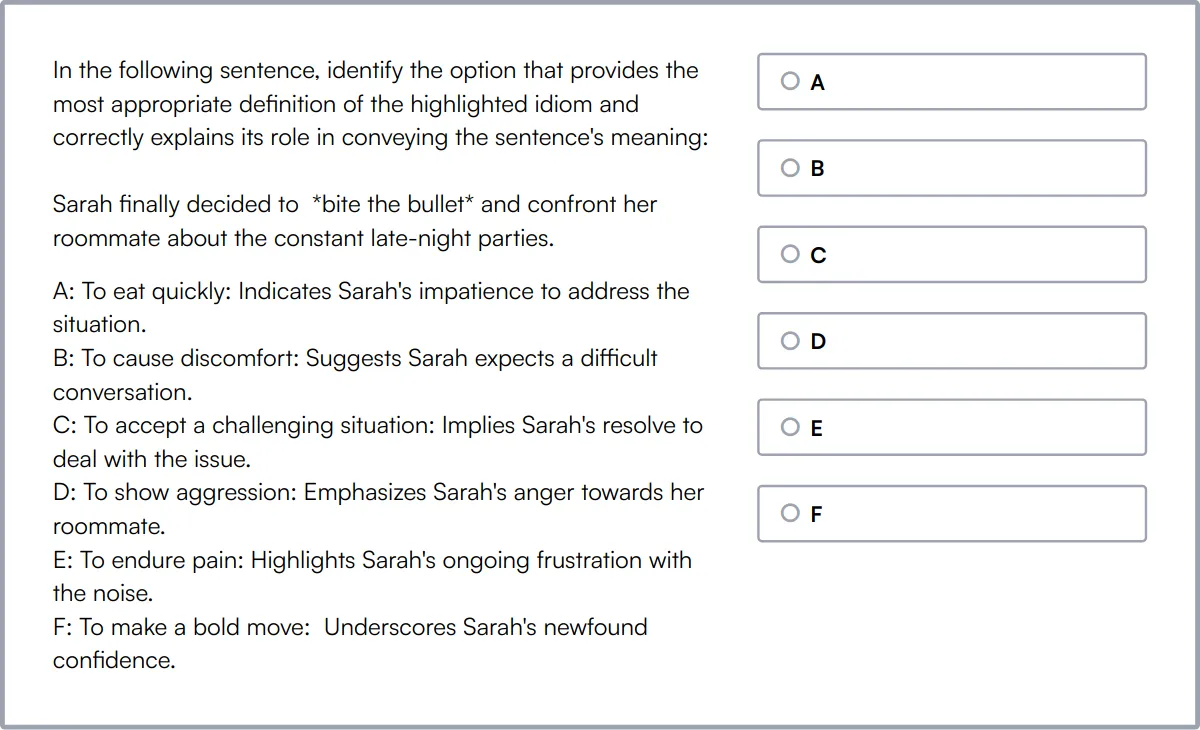
Situational Judgement Test
Our Situational Judgement Test uses scenario-based questions to assess a candidate's ability to handle workplace challenges professionally.
The test evaluates skills such as problem solving, work management, communication, time management, and decision-making. It also covers ethics, integrity, and adaptability.
Candidates who perform well show strong emotional intelligence, relationship-building skills, and the ability to work effectively in a team.
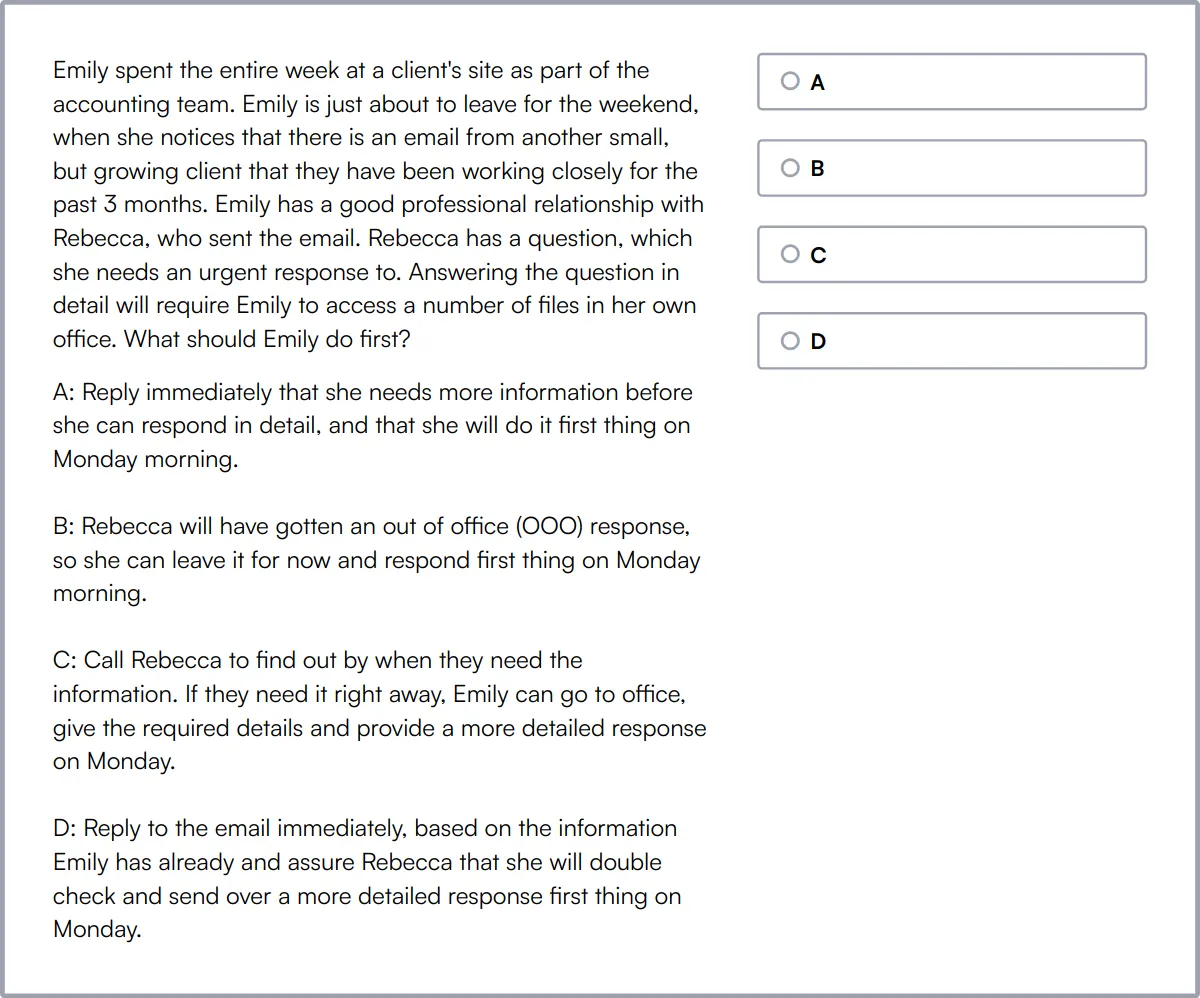
Copywriting Skills Test
Our Copywriting Skills Test focuses on evaluating candidates' grammar, vocabulary, reading comprehension, and attention to detail.
The test covers headline writing, subheading creation, SEO writing, call to action (CTA) creation, and social media copywriting. It also assesses editing, proofreading, and understanding brand voice and tone.
High-scoring candidates demonstrate proficiency in writing for different formats and mediums, with a strong understanding of audience targeting and writing with empathy.
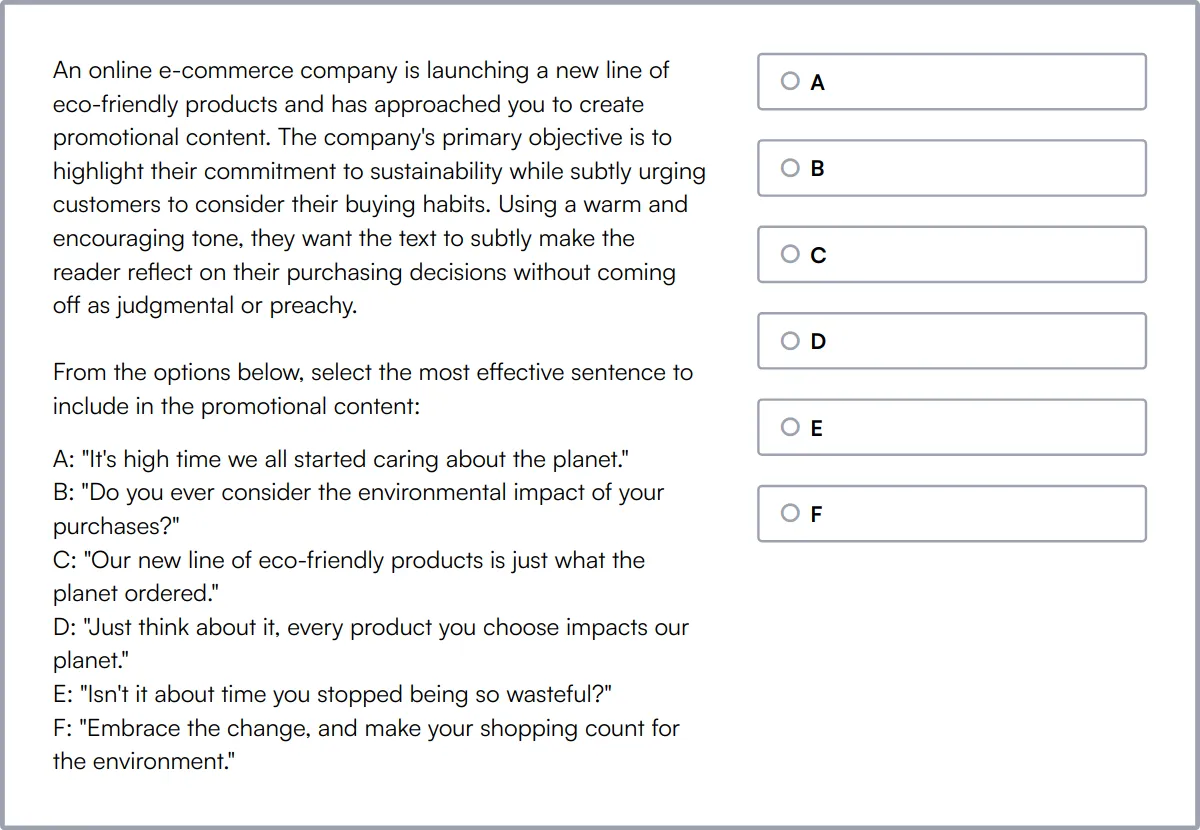
Content Strategy Test
Our Content Strategy Test evaluates candidates' knowledge and skills in developing effective content strategies for digital platforms.
The test assesses abilities in audience analysis, content planning, keyword research, SEO, and content creation. It also covers content performance measurement, multichannel content strategy, and user experience (UX) optimization.
Successful candidates show a deep understanding of the content lifecycle, content governance, and crisis communication.
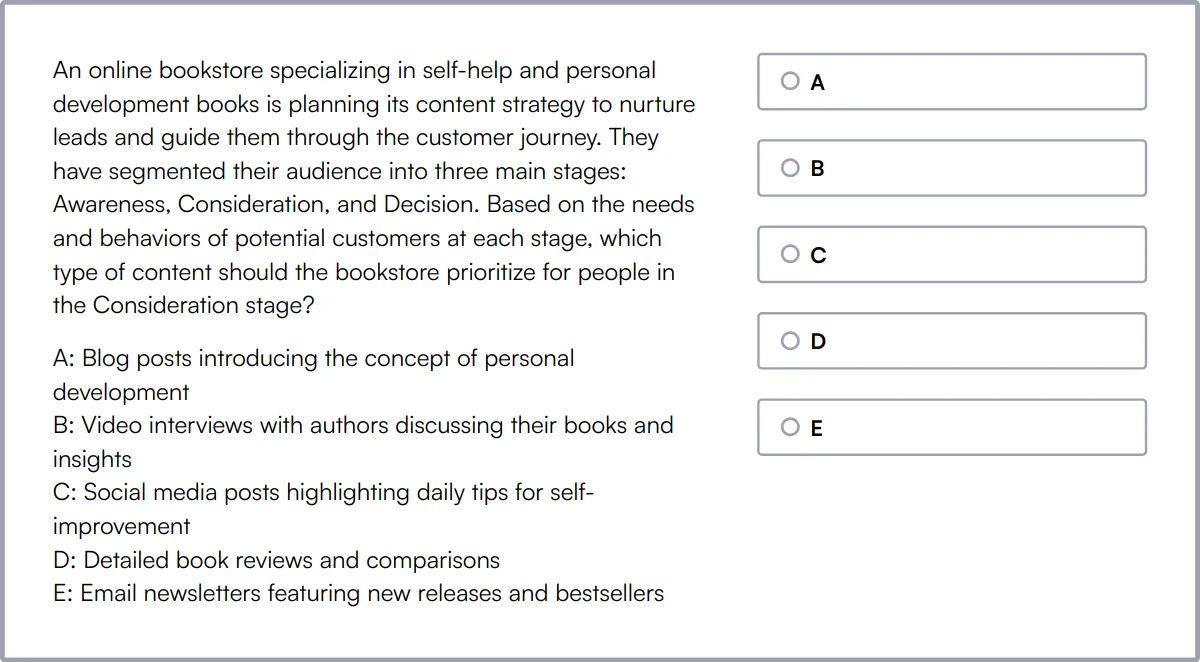
UI/UX Design Test
Our UI/UX Design Test focuses on testing concepts around wire-framing, prototyping, A/B testing, landing pages, and UI/UX design principles.
The test evaluates skills in design thinking, user research techniques, interaction design principles, and visual design principles. It also covers information architecture, mobile app design considerations, and accessibility guidelines.
Candidates who excel demonstrate a strong ability to create user-centered designs and optimize user experiences across various platforms.
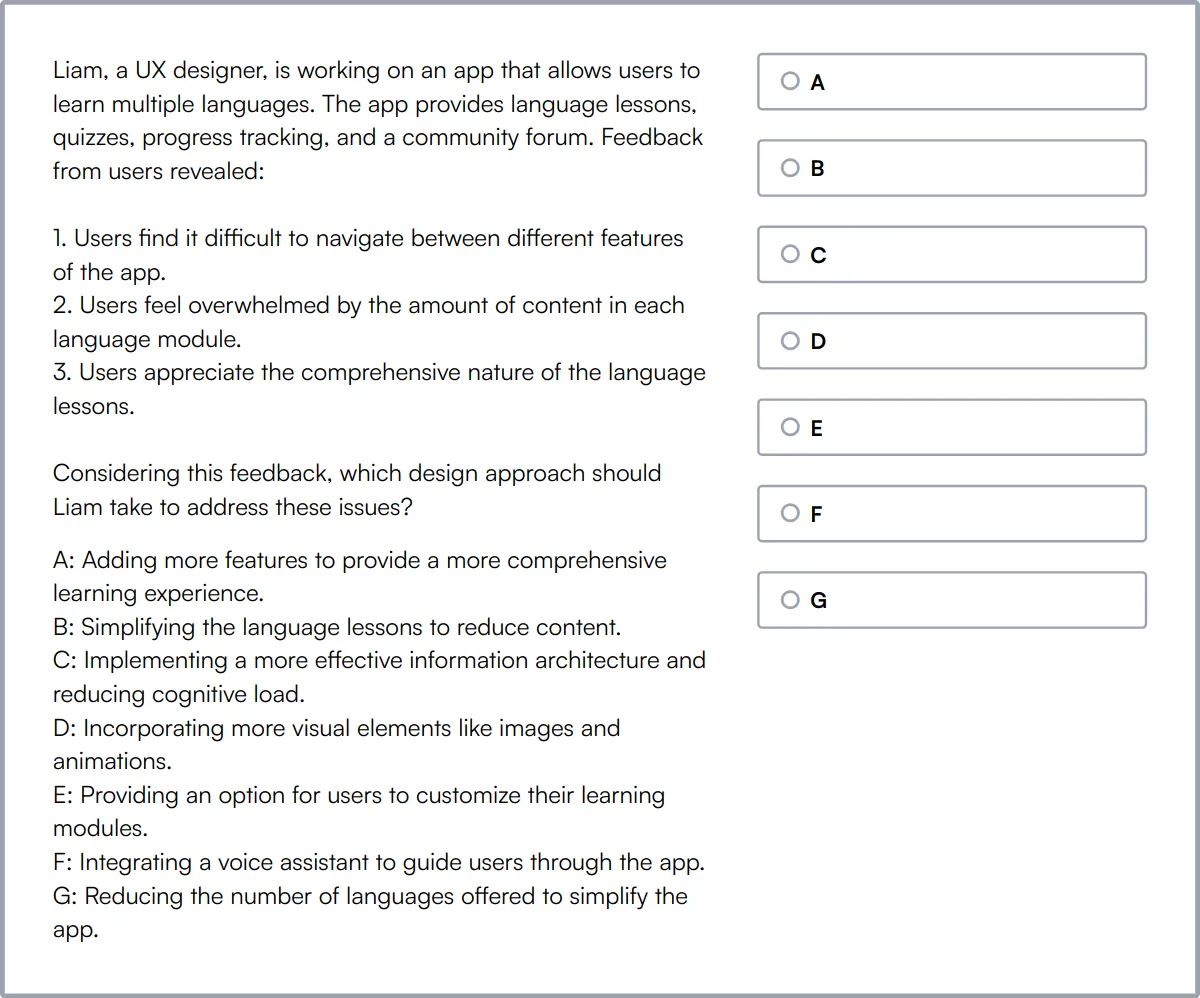
PPC Assessment Test
Our PPC Assessment Test uses scenario-based multiple choice questions to evaluate candidates on their understanding of pay-per-click advertising concepts and strategies.
The test covers keyword research, ad copywriting, bid management, landing page optimization, and conversion tracking. It also assesses campaign performance analysis and budget management.
High-scoring candidates demonstrate strong skills in digital marketing, online advertising, and market analysis.
Summary: The 9 key UX Writer skills and how to test for them
| UX Writer skill | How to assess them |
|---|---|
| 1. Writing Clarity | Evaluate the ability to convey information clearly and concisely. |
| 2. User Empathy | Assess understanding of user needs and perspectives. |
| 3. Microcopy Crafting | Check skill in writing effective, concise interface text. |
| 4. Content Strategy | Determine capability in planning and managing content lifecycle. |
| 5. Information Architecture | Evaluate structuring and organizing content for usability. |
| 6. SEO Knowledge | Assess understanding of optimizing content for search engines. |
| 7. Collaboration | Gauge ability to work well with cross-functional teams. |
| 8. Usability Testing | Check experience in conducting and analyzing user tests. |
| 9. Adaptability | Assess ability to adjust to changing project requirements. |
UI/UX Design Test
UX Writer skills FAQs
What are the key writing skills required for a UX Writer?
A UX Writer should excel in writing clarity and microcopy crafting. They need to create concise, engaging content that guides users seamlessly through a digital product.
How important is user empathy in the UX Writing process?
User empathy is central to UX writing. Understanding user needs and emotions enables writers to craft content that improves user experience and engagement.
What role does SEO knowledge play in UX Writing?
SEO knowledge helps UX Writers optimize content to ensure it is discoverable and ranks well in search engines, enhancing the visibility of the digital product.
Can you explain the importance of content strategy in UX Writing?
Content strategy involves planning and managing content creation and distribution. It ensures that all written content aligns with the user's needs and business goals.
Why is collaboration important for a UX Writer?
Collaboration with designers, developers, and product managers ensures that the text aligns with visual and functional aspects of the product, leading to a cohesive user experience.
How does a UX Writer use analytics interpretation?
Analytics interpretation helps UX Writers understand user behavior, enabling them to refine and optimize content to better meet user needs and enhance engagement.
What is the significance of A/B testing in UX Writing?
A/B testing allows UX Writers to compare different versions of content to determine which better achieves desired user engagement and conversion rates.
How do UX Writers ensure content accessibility?
UX Writers must adhere to accessibility standards to ensure content is usable for people with disabilities, which includes using clear language and providing alternative text for images.

40 min skill tests.
No trick questions.
Accurate shortlisting.
We make it easy for you to find the best candidates in your pipeline with a 40 min skills test.
Try for freeRelated posts
Free resources



